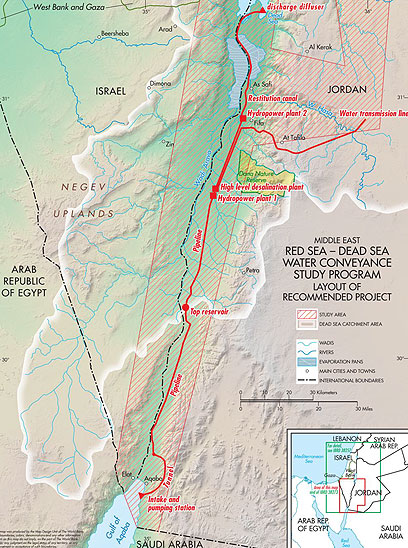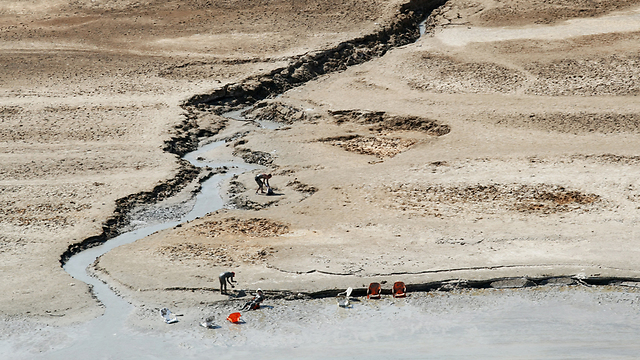Israel, Jordan, PA sign historic Red Sea-Dead Sea canal deal
Overcoming political obstacles, Israel, Jordan, Palestinian Authority sign what Energy Minister Silvan Shalom called 'historic agreement' securing additional 100 million metric cubes of water supplies for residents of Israel, West Bank, Jordan
The Red Sea–Dead Sea Conduit also known as the Two Seas Canal will carry some 100 million metric cubes of water to the north annually, thus hopefully slowing down the process Dead Sea's desiccation. As part of the cooperation, a joint water purification plant will be formed and Israelis, Jordanians and Palestinians will share the water.
Related stories:
- World Bank says Red-Dead project feasible
- Dead Sea faces shrinking, flooding
- Jordan, Israel in advanced talks on water deal
Israeli Energy Minister Silvan Shalom – who is also the minister for regional cooperation and infrastructure minister – will represent Israel in the signing ceremony, and will be joined by both Jordanian and Palestinian water ministers. "This is a historical agreement," Shalom said, adding it was a "dream come true."

The pipeline's projected route
According to the agreement, some 200 million metric cubes of water will be pumped from the Read Sea annually, some 80 million of which will be desalinated in a special facility to be built in Aqaba, Jordan; 30-50 million cubic meters will be allocated to Israel for usage in the Arava and Eilat.
The Jordanians will receive 30 million cubes for their own southern region and an additional 50 million cubes of grey-water from the Kinneret for the north.
As part of the agreement's negotiations, the Palestinians requested a foothold in the northern part of the dead see, in the Ein Pushka area, but Israel refused. In stead, the Palestinian Authority will receive some 30 million cubes from the Kinneret – either desalinated water or grey-water at production cost – which will increase water supplies for West Bank residents.
The entirety of the pipeline will be laid in Jordan, thus circumnavigating issues raised by environmental organizations in Israel. Baring unexpected delays, the construction of the pipeline and purification facility will be completed within four to five years.
The full story was published in Monday's Yedioth Ahronoth
Nahum Barnea is a senior Yedioth Ahronoth correspondant
- Receive Ynetnews updates
directly to your desktop
















